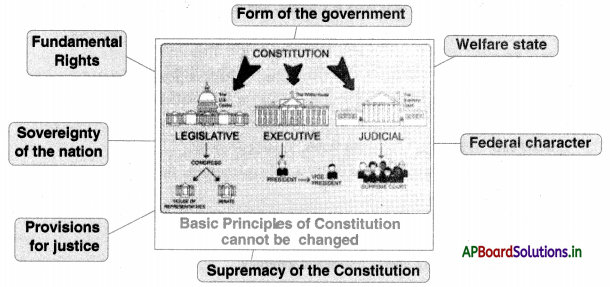Students can go through AP State Board 10th Class Social Studies Notes Chapter 17 The Making of Independent India’s Constitution to understand and remember the concept easily.
AP State Board Syllabus 10th Class Social Studies Notes Chapter 17 The Making of Independent India’s Constitution
→ The constitution outlines the structure and powers of the government and its organs like executive, legislature, judiciary, etc.
→ It indicates the nature of the future society which has to be built by the joint efforts of the state and the society.
→ The Constitution of India was prepared and adopted by the Constituent Assembly,
→ The Provincial Assemblies indirectly elected members and the Princely States nominated members to Constituent Assembly.
→ A Drafting Committee was set up under the chairmanship of Dr. B.R. Ambedkar and its task was to prepare the final draft taking into account all viewpoints.
→ The Draft Constitution is a formidable document containing 895 Articles and 8 Schedules (In the text-only 315 Articles were given). (At present Indian Constitution contains 448 Articles and 12 Schedules.)
→ We have Parliamentary Democracy in our country.
→ The USA has Presidential Democracy in their country.
→ Our President can do nothing contrary to the advice of the Council of Ministers nor can he do anything without their advice,
→ We have a federal system with single citizenship, a single integrated judiciary, and a common All India Civil Service.
→ Whereas the USA has a federal system with dual citizenship, dual judiciary, and duality of services.
![]()
→ Our Constitution supported decentralization under article 40 to set up and expand Gram panchayats or local self-governance.
→ Our Constitution abolished untouchability in any form under article 17.
→ Amending the articles can be initiated only by the Parliament.
→ Some amendments should get 2/3rd members’ approval in both the houses of Parliament – Lok Sabha and Rajya Sabha.
→ Some articles may be amended only with acceptance from the state legislatures as well.
→ In the Keshavanada Bharati case, it was argued that certain provisions in the Indian Constitution cannot be changed under any circumstances like Fundamental Rights.
→ Drafting Committee: A committee appointed by the Constituent Assembly for preparing the first draft of the Constitution.
→ Constituent: An assembly whose purpose is to frame a Constitution for the Assembly country
→ Preamble: Introduction which embodies the basic principles on which Constitution is based.
→ Concurrent list: A list of 47 items given in part XI of the Constitution of India, concerned with the relation between the Union and States. This part is divided between legislative and administrative powers.
→ Unitary principles A strong Centre, a single Constitution, flexibility of the Constitution, single citizenship, inequality of representation in the upper house, etc.
→ Federal principles: Rigiil and written Constitution, decentralization of powers, power to alter the boundaries.
→ Citizenship The state of being vested with the rights, privileges, and duties of a citizen.
![]()
→ Presidential system: A presidential system is a republic system of government where a head of government is also head of state.
→ Parliamentary system: A parliamentary system is a system of democratic governance of a state in which the executive branch derives its democratic legitimacy from, and is held accountable to the legislature, the executive.
→ Amendment: A procedure is laid down in the Constitution itself by which changes can be brought about. This is an amendment.
→ Constitution: A Constitution is a body of laws and rules according to which a country is governed.
→ Polity: The system of government or political organization.
→ Dual Polity: Union at the center and states at the periphery each with sovereign powers assigned to them by the Constitution.
→ Federal system: Dual polity (or) a system of two governments at two levels with well-defined powers.
→ Sovereign state: A state having supreme power (in internal and external affairs) and fully independent.
→ Socialist state: One which tries to bring about economic and social equality.
→ Secular state: A state which does not have any religious concern or does not interfere with the religious affairs of people.
![]()
→ Justice: Everyone should be treated with equal fairness or everyone should be given his/her due.
→ Equality: Each individual is assured of equality of status and opportunity for development.
